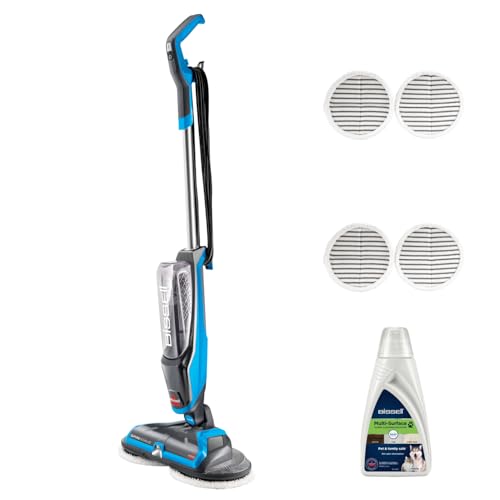




Cleaning your washing machine regularly is essential to keep it running smoothly and to ensure that your clothes come out fresh and clean. Two common cleaning solutions that people often turn to are bleach and vinegar. But which one is the best option for cleaning your washing machine?
Bleach is a powerful disinfectant that can effectively kill bacteria and remove stains, making it a popular choice for cleaning appliances. When used in your washing machine, bleach can help eliminate any build-up of mould, mildew, and odours. It can also help remove stubborn stains from your machine’s drum and agitator.
However, it’s important to note that bleach can be harsh and potentially damaging to certain types of machines. If you have a front-loading washing machine, using bleach can corrode the rubber seals and gaskets, leading to leaks and costly repairs. Additionally, bleach can be harmful if not used properly, so make sure to follow the instructions and use it in a well-ventilated area.
Vinegar is a more natural and environmentally-friendly alternative to bleach. It’s acidic properties make it effective for breaking down soap scum, mineral deposits, and other residues that can accumulate in your washing machine. Vinegar also has the added benefit of being a deodorizer, helping to eliminate any unpleasant smells that may linger in your machine.
Unlike bleach, vinegar is safe to use on all types of washing machines, including front-loaders. It won’t damage rubber seals or gaskets, making it a gentler option for regular maintenance. However, vinegar may not be as effective as bleach when it comes to killing bacteria or removing tough stains.
In conclusion, both bleach and vinegar have their pros and cons when it comes to cleaning your washing machine. If you’re looking for a powerful disinfectant and stain remover, bleach may be the better choice. However, if you prefer a more natural and gentle option, vinegar is a safe and effective solution. Ultimately, the best cleaning solution for your washing machine will depend on your needs and preferences.
The Importance of a Clean Washing Machine
A clean washing machine is essential for maintaining good hygiene and prolonging the life of your clothes. Over time, dirt, grime, and bacteria can build up inside your washing machine, which can then transfer onto your clothes during each wash cycle. Furthermore, a dirty washing machine can also cause unpleasant odors to develop, leaving your laundry smelling less than fresh.
Regularly cleaning your washing machine can help to ensure that your clothes come out clean and odor-free. It can also prevent the growth of mold and mildew, which can be harmful to your health. In addition, a clean washing machine will also help your detergent to work more effectively, resulting in cleaner and brighter clothes.
The Benefits of Using Bleach
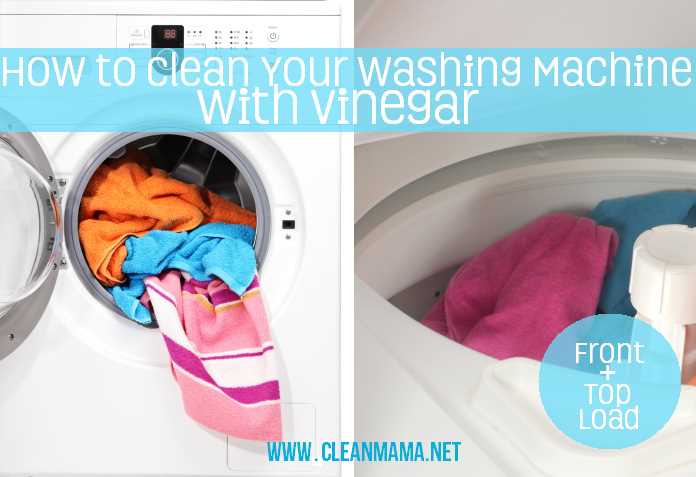
Bleach is a powerful cleaning solution that can effectively kill bacteria, remove stains, and eliminate odors. When used in the washing machine, bleach can help to disinfect the interior, ensuring that your clothes are free from harmful germs. It can also remove any stubborn stains, such as those caused by grass, blood, or ink.
Another benefit of using bleach is its ability to remove unpleasant odors. Bleach can eliminate any musty or mildew smells that may have developed in your washing machine, leaving your laundry smelling fresh and clean. Additionally, bleach can help to remove soap scum and mineral deposits, which can build up over time and affect the efficiency of your machine.
The Benefits of Using Vinegar
Vinegar is a natural and eco-friendly alternative to bleach that can also effectively clean your washing machine. It is particularly useful for removing mineral deposits and soap scum, which can accumulate in the drum and pipes of your machine. Vinegar can dissolve these deposits, ensuring that your washing machine runs smoothly and efficiently.
In addition to its cleaning properties, vinegar also acts as a natural deodorizer. It can eliminate any unpleasant odors that may have developed in your washing machine, leaving your laundry smelling fresh without the use of harsh chemicals. Vinegar is also safe to use on most fabrics and colors, making it a versatile option for cleaning your machine and laundry.
Choosing the Best Cleaning Solution
- Consider the type of washing machine you have. Some manufacturers may recommend using bleach, while others may advise against it.
- If you choose to use bleach, be sure to follow the instructions on the packaging carefully. Avoid using too much bleach, as this can damage your machine and clothing.
- If you prefer a natural and eco-friendly option, vinegar can be a suitable alternative. Use distilled white vinegar and follow the instructions for cleaning your machine.
- Regardless of the cleaning solution you choose, it is important to regularly clean your washing machine to maintain its efficiency and hygiene.
Ultimately, the best cleaning solution for your washing machine will depend on your personal preferences, the type of machine you have, and any specific instructions from the manufacturer. Both bleach and vinegar can effectively clean your machine, so choose the option that aligns with your cleaning goals and values.
The Role of Cleaning Solutions
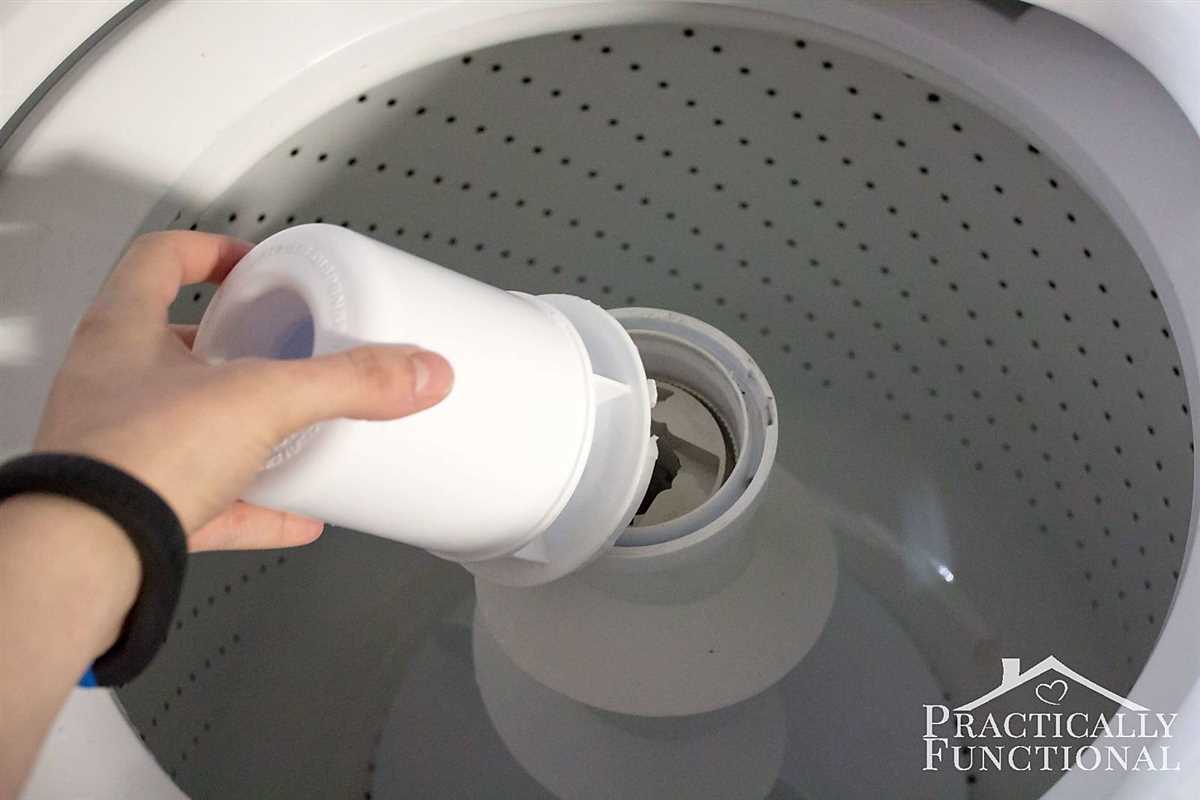
Cleaning solutions play a crucial role in maintaining the cleanliness and functionality of your washing machine. Over time, dirt, grime, and bacteria can accumulate on the surfaces of the machine, leading to unpleasant odors and reduced performance. Regular cleaning with the right cleaning solution can help remove these contaminants and ensure that your machine operates effectively.
Why Use Cleaning Solutions?
The use of cleaning solutions is important for several reasons:
- Removal of Tough Stains: Cleaning solutions are designed to break down and remove tough stains, such as grease, oil, and dirt, that can accumulate in your washing machine. These stains can affect the appearance and performance of your machine, so regular cleaning is essential.
- Elimination of Bacteria and Odors: Washing machines can harbor bacteria, fungi, and other microorganisms that can cause unpleasant odors and potentially impact your health. Cleaning solutions can help kill and remove these microorganisms, ensuring that your machine smells fresh and is hygienic for use.
- Prevention of Build-up: Cleaning solutions can prevent the build-up of limescale and detergent residue in your washing machine. Over time, these deposits can clog the internal components of the machine, leading to reduced performance and potentially costly repairs.
- Prolonged Lifespan: Regular cleaning with appropriate solutions can help prolong the lifespan of your washing machine. Removing dirt and debris from the machine’s surfaces and internal components can prevent wear and tear, allowing your machine to function optimally for years to come.
Choosing the Right Cleaning Solution
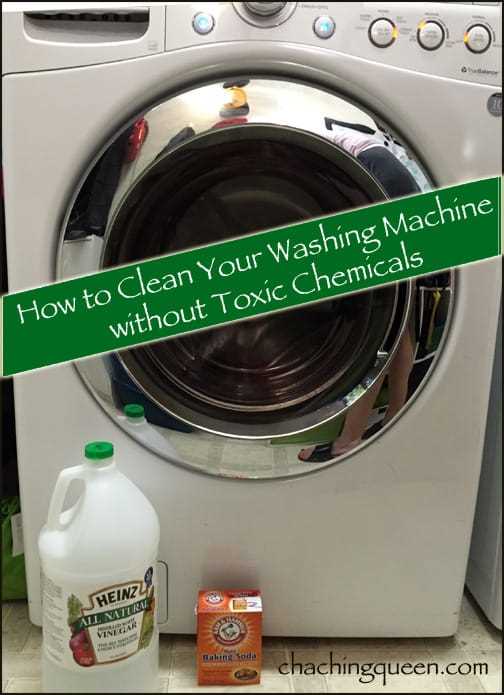
When selecting a cleaning solution for your washing machine, it’s important to choose one that is suitable for your machine’s specific needs. Consider the following factors:
- Type of Washing Machine: Different washing machine models may require different cleaning solutions. Read the manufacturer’s instructions or consult the user manual to identify the recommended cleaning solution for your machine.
- Type of Stain: Consider the types of stains you commonly encounter in your machine. Some cleaning solutions are specifically formulated to target certain types of stains, so choose one that addresses your needs.
- Environmental Considerations: If you are conscious about the impact of cleaning solutions on the environment, choose an eco-friendly option that is free from harmful chemicals.
Remember to always follow the instructions provided by the cleaning solution manufacturer. Using the right amount of solution and adhering to the recommended cleaning frequency will ensure that you achieve optimal results.
Conclusion
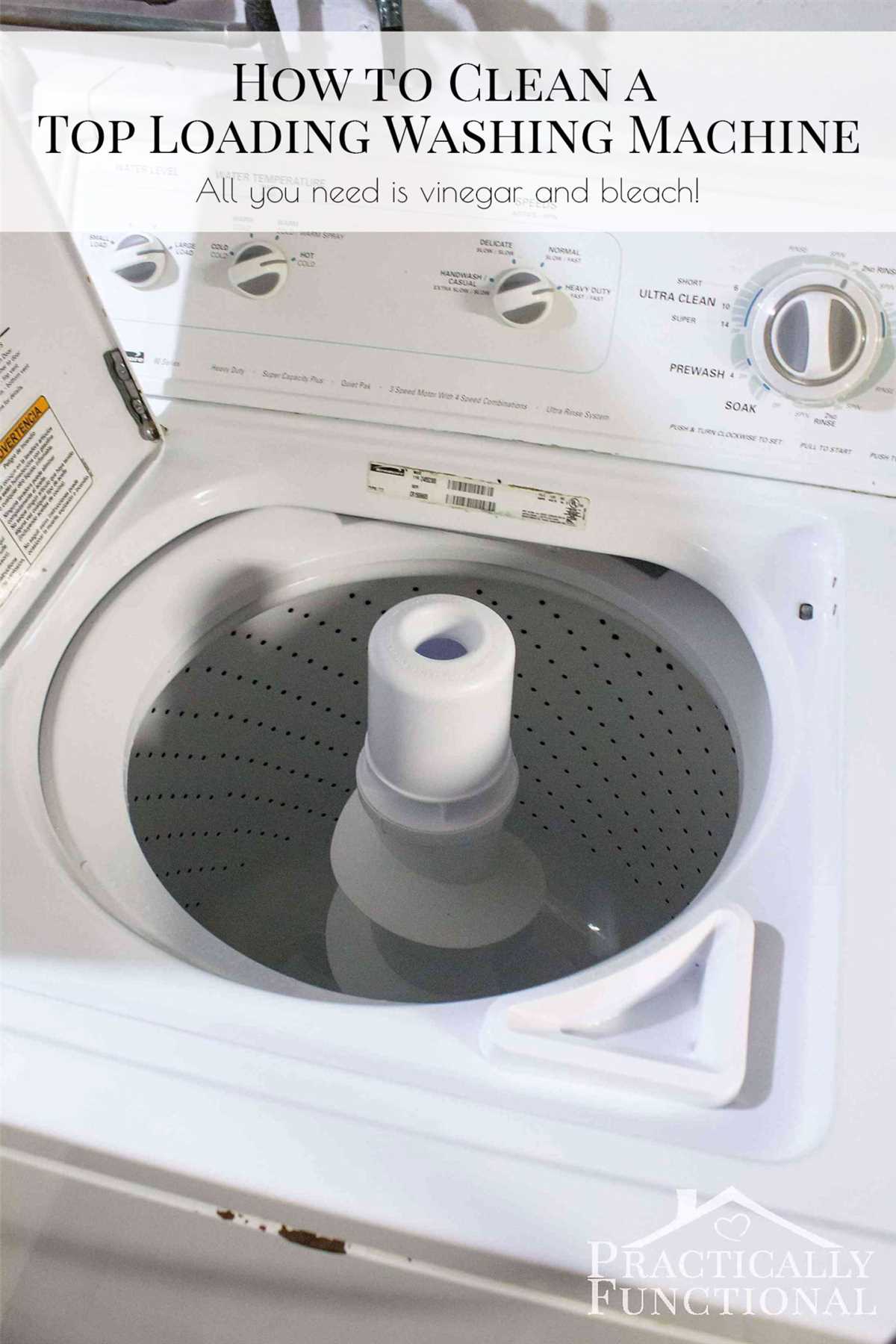
Cleaning solutions are essential for maintaining the cleanliness and performance of your washing machine. By regularly using the right cleaning solution, you can remove tough stains, eliminate bacteria and odors, prevent build-up, and prolong the lifespan of your machine. Consider the specific needs of your machine and the types of stains you commonly encounter when selecting a cleaning solution. By doing so, you can keep your washing machine in top condition and ensure fresh and effective laundry results.
Benefits of Using Bleach
- Effective Disinfectant: Bleach is a powerful disinfectant that can kill most bacteria, viruses, and germs that may be present in your washing machine. This is especially important for households with members who have weakened immune systems or allergies.
- Whitening Capabilities: One of the key benefits of using bleach is its ability to whiten clothes. Adding bleach to your laundry can help remove stains, restore the brightness of white fabrics, and make them appear fresh and clean.
- Odor Elimination: Bleach has a strong scent that can help mask unpleasant odors in your washing machine. It can neutralize and eliminate the smell of mold, mildew, and other unpleasant odors that may accumulate over time.
- Mold and Mildew Prevention: Regular use of bleach can help prevent the growth of mold and mildew in your washing machine. These fungi thrive in damp environments and can be responsible for musty smells and stains on your clothes.
- Cost-effective Solution: Bleach is an affordable cleaning solution that can be easily found in most households. By using bleach to clean your washing machine, you can avoid the need to purchase expensive specialty cleaning products.
- Easy to Use: Bleach is a simple solution that can be easily added to your washing machine during your regular laundry routine. Just follow the instructions on the bleach bottle to ensure the proper amount is used.
Effective Disinfection
Disinfection is an important step in cleaning your washing machine to maintain its cleanliness and prevent the growth of bacteria and mold. Both bleach and vinegar are effective disinfectants, but they have different properties and uses.
Bleach for Disinfection
- Bleach, commonly known as sodium hypochlorite, is highly effective at killing germs, bacteria, and viruses.
- It can be used to disinfect the interior of your washing machine, eliminating any lingering bacteria or mold.
- When using bleach, it is important to follow the manufacturer’s instructions and dilute it properly to avoid damaging your washing machine or the clothes you wash.
- Bleach should not be used on colored fabrics, as it can cause fading or discoloration.
- It is recommended to run an empty cycle with bleach once a month to keep your washing machine fresh and clean.
Vinegar for Disinfection
- Vinegar, specifically white distilled vinegar, is a natural disinfectant.
- It is effective at killing bacteria and viruses, but it may not be as potent as bleach.
- Vinegar can be used to remove odors and residue from your washing machine.
- It is safe to use on most fabrics and colors, as it does not cause fading or discoloration.
- Vinegar can also help to remove stubborn stains and buildup on the interior of your washing machine.
- For effective disinfection, it is recommended to use vinegar in combination with hot water and run a wash cycle.
Ultimately, both bleach and vinegar can effectively disinfect your washing machine. The choice between the two depends on your preferences, the type of fabric you wash, and any allergies or sensitivities you may have. It is important to use these cleaning solutions properly and in the appropriate amounts to maintain the cleanliness of your washing machine.
Removal of Tough Stains
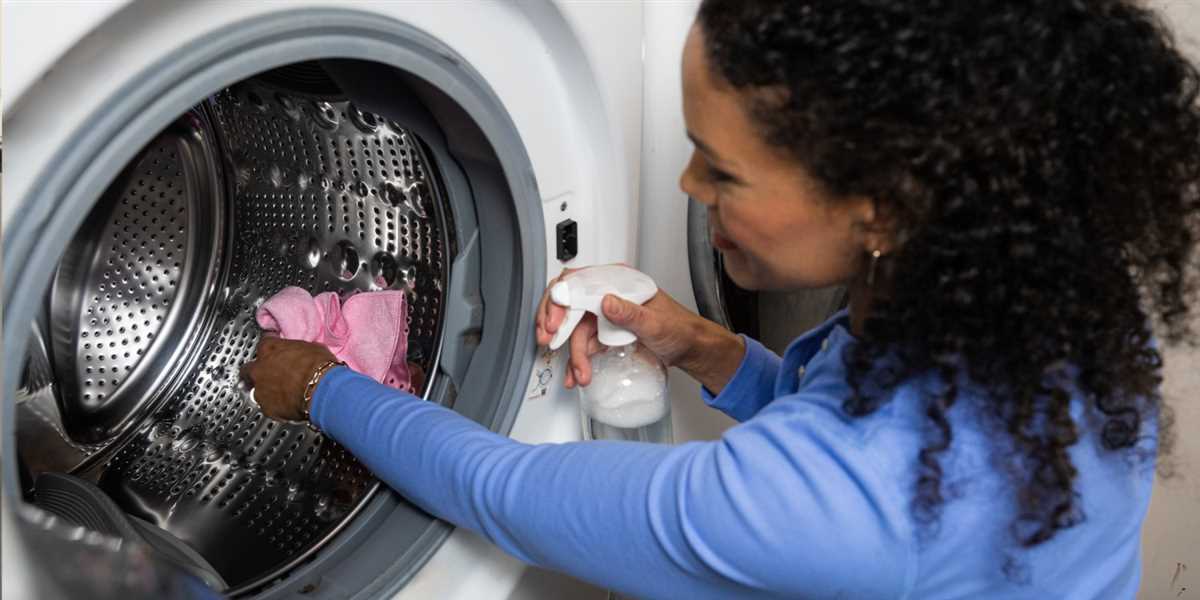
Tough stains can be a hassle to remove from your washing machine, but both bleach and vinegar can help in tackling these stubborn marks. Here is a comparison of how each solution can help remove tough stains:
Bleach
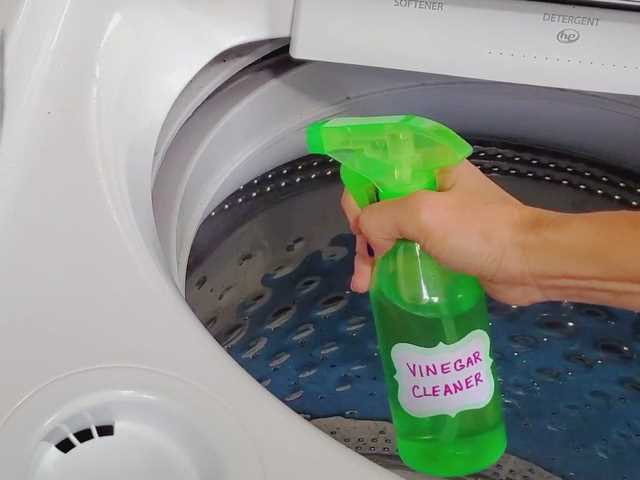
- Bleach is a powerful cleaning agent that contains chlorine, which is effective in breaking down tough stains.
- It can be used to eliminate stains caused by dirt, grease, and other stubborn substances.
- To remove tough stains, add 1 cup of bleach to a regular cycle with hot water, and let the machine run for a full cycle.
- Make sure to follow the manufacturer’s instructions and guidelines when using bleach in your washing machine.
Vinegar
- Vinegar is an acidic solution that helps dissolve tough stains and eliminate odors.
- It is effective in removing stains caused by mineral deposits, detergent residue, and mildew.
- To remove tough stains, add 1 cup of vinegar to a regular cycle with hot water, and let the machine run for a full cycle.
- Make sure to use distilled white vinegar and avoid using colored or flavored vinegar, as they may stain your clothes.
Both bleach and vinegar can be effective in removing tough stains from your washing machine. However, it is important to consider the type of stain you are dealing with and follow the manufacturer’s guidelines to ensure the safety of your machine and clothes. Regular maintenance and cleaning can also help prevent the build-up of tough stains in the future.
Elimination of Odors
One common issue with washing machines is the buildup of unpleasant odors over time. These odors can be caused by a variety of factors, including bacteria, mold, and mildew. Fortunately, both bleach and vinegar can help eliminate these odors effectively.
Bleach
Bleach is a powerful disinfectant that can kill bacteria and mold, making it an effective solution for removing odors from your washing machine. To use bleach for odor elimination, simply add one cup of bleach to the detergent drawer or directly into the wash drum. Run a hot water cycle without any laundry to allow the bleach to penetrate and clean the machine thoroughly.
Caution: When using bleach, make sure to follow safety guidelines and avoid mixing it with other cleaning products, as this can produce harmful fumes.
Vinegar
Vinegar is a natural cleaning agent that can also help eliminate odors from your washing machine. It can effectively kill bacteria and remove mildew and mold. To use vinegar for odor elimination, add one cup of white vinegar to the detergent drawer or directly into the wash drum. Run a hot water cycle without any laundry to allow the vinegar to clean and deodorize the machine.
Note: It’s important to use distilled white vinegar, as other types may leave a residue or odor behind.
Comparison
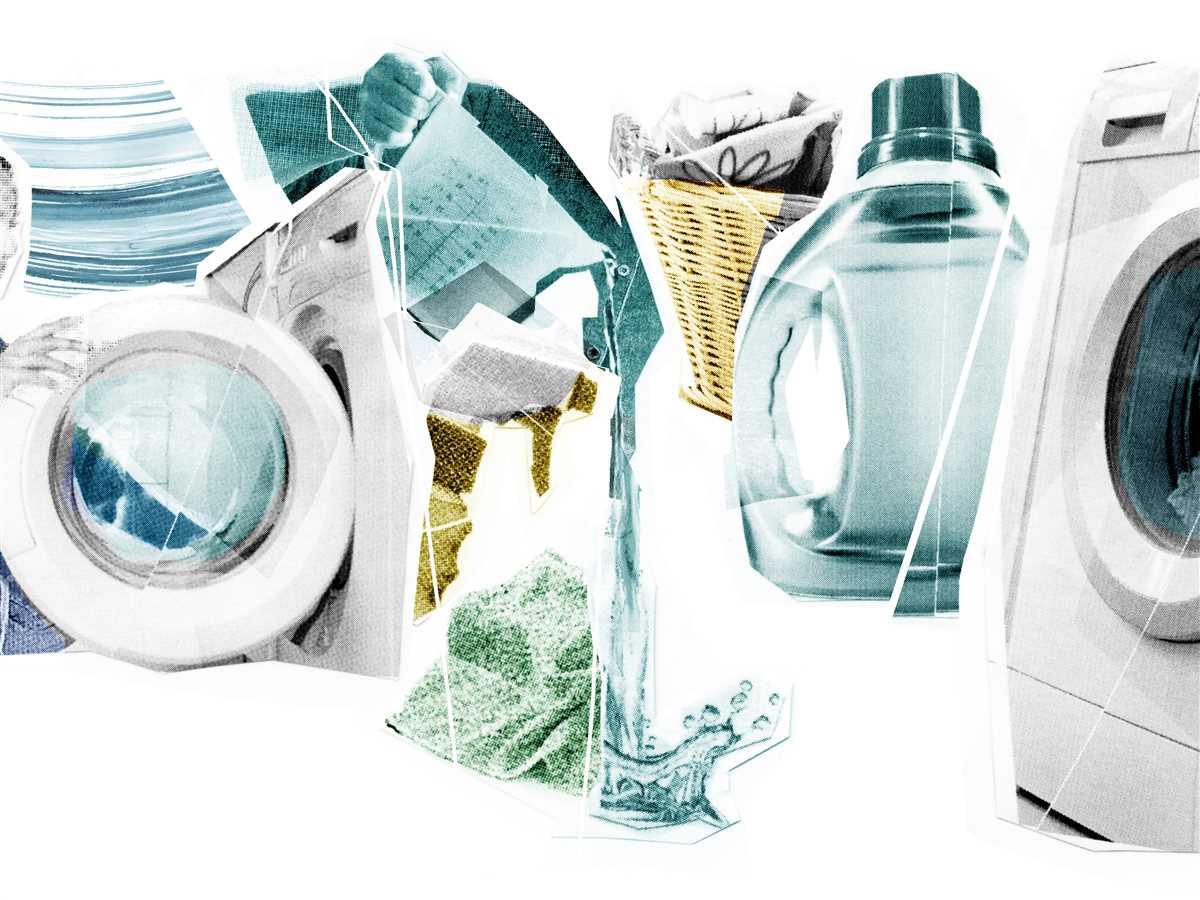
Both bleach and vinegar can effectively eliminate odors from your washing machine, but they have some differences to consider:
- Effectiveness: Bleach is a powerful disinfectant and can be more effective in killing bacteria and mold. However, vinegar is a natural alternative that can also get the job done.
- Safety: Bleach can be harsh on fabrics and may cause color fading or damage. Vinegar, on the other hand, is generally safe to use and won’t cause harm to your laundry.
- Residue: Bleach may leave a strong smell behind, especially if not rinsed properly. Vinegar, when used in the correct amount, will not leave any residue or odor after rinsing.
- Environmentally friendly: Vinegar is a more environmentally friendly solution compared to bleach, as it is a natural product without any harsh chemicals.
| Criteria | Bleach | Vinegar |
|---|---|---|
| Effectiveness | High | Moderate |
| Safety | Use with caution | Generally safe |
| Residue | Possible | No residue |
| Environmentally friendly | No | Yes |
Ultimately, the choice between bleach and vinegar for odor elimination in your washing machine depends on your preferences and needs. If you prefer a stronger disinfectant and don’t mind the potential risks, bleach may be the better option. However, if you prioritize safety, environmental friendliness, and don’t mind a slightly milder solution, vinegar can be a suitable alternative.
Advantages of Using Vinegar
Natural and Non-Toxic
Vinegar is a natural cleaning agent that is non-toxic and safe for both you and the environment. It does not contain any harsh chemicals that can be harmful to your health or cause damage to your washing machine. If you have allergies or sensitivities to strong chemical smells, vinegar is a great alternative.
Effective in Removing Stains and Odors
Vinegar is known for its ability to remove stains and odors from various surfaces, including your washing machine. It can effectively remove detergent residue, hard water stains, and even mildew or mold that may be present in your machine. Its acidic properties help break down and dissolve these substances, leaving your machine cleaner and fresher.
Safe for All Types of Machines
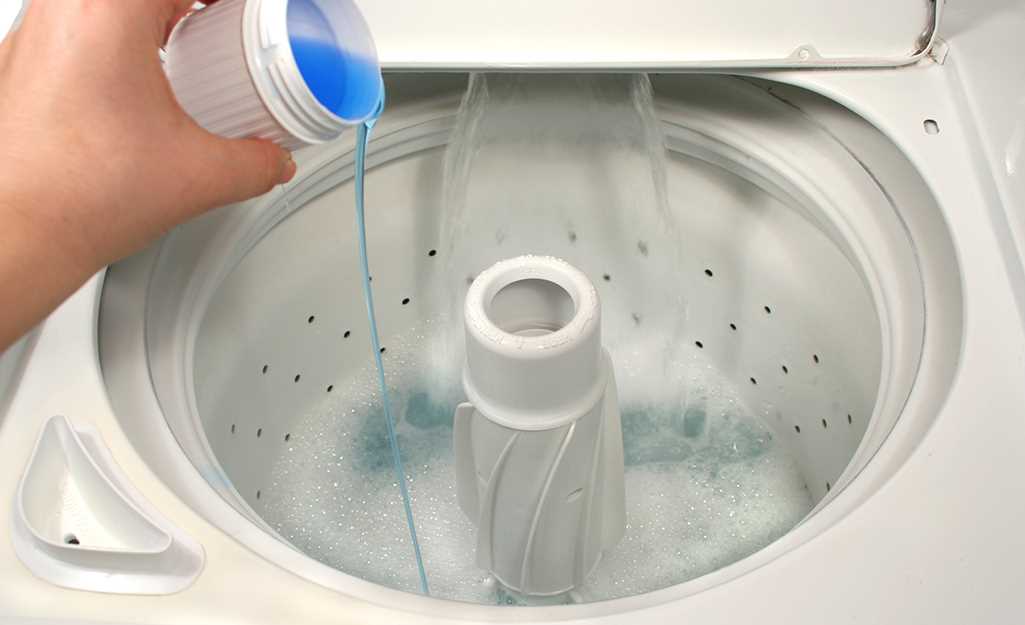
Vinegar is safe to use in all types of washing machines, including top-loaders and front-loaders. Whether you have a traditional agitator machine or a high-efficiency model, vinegar can be used without causing any damage or affecting the performance of your machine. Just make sure to follow the recommended dosage and instructions for use.
Affordable and Easily Accessible
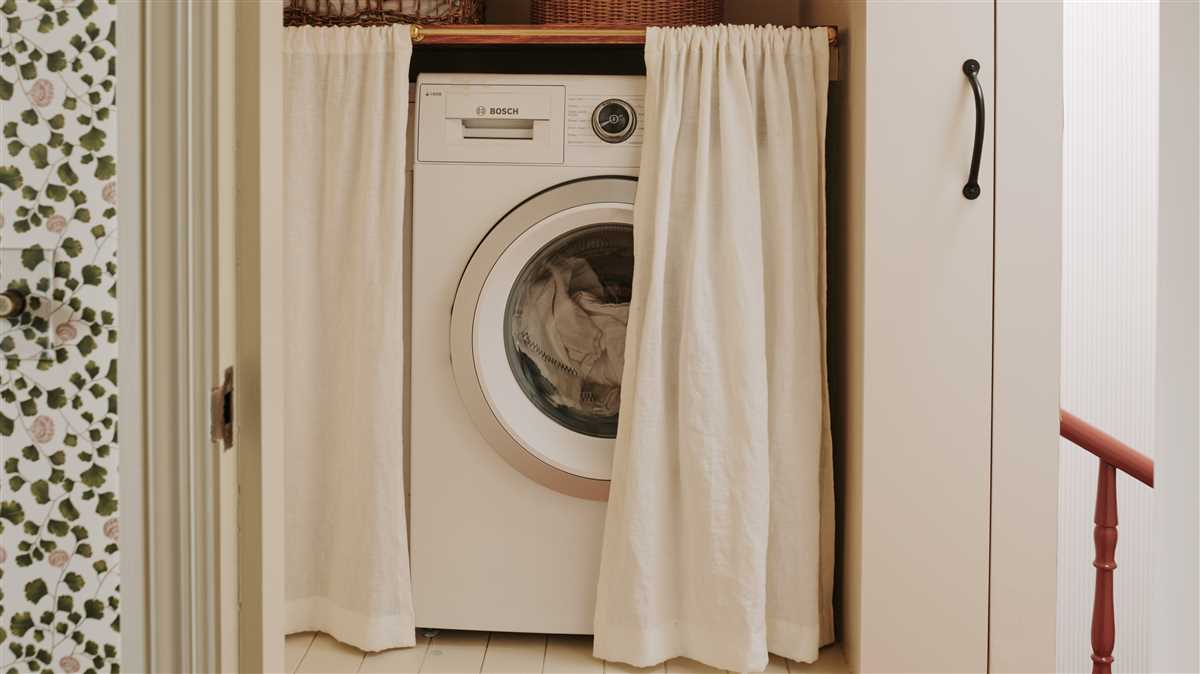
One of the biggest advantages of using vinegar as a cleaning solution is its affordability and accessibility. Vinegar can be found in most households and is readily available in grocery stores. It is a cost-effective alternative to commercial cleaning products and can be used for various other cleaning purposes around the house as well.
Environmentally Friendly
Using vinegar as a cleaning solution is an environmentally friendly choice. It is biodegradable and does not contribute to water or air pollution like some chemical-based cleaners do. By opting for vinegar, you are minimizing your carbon footprint and reducing the use of harmful substances in your cleaning routine.
FAQ
Why should I clean my washing machine?
It is important to clean your washing machine regularly to prevent the buildup of dirt, grime, and bacteria. Cleaning your washing machine can also help improve its performance and extend its lifespan.
What are the benefits of using bleach as a cleaning solution?
Bleach is a powerful disinfectant that can kill bacteria and viruses, making it an effective cleaning solution for your washing machine. It can also remove stains and odors, leaving your machine smelling fresh.
Can vinegar be used as an alternative to bleach?
Yes, vinegar can be a good alternative to bleach for cleaning your washing machine. Vinegar is a natural cleaner that can help dissolve mineral deposits and remove odors. It is also safer to use than bleach and does not leave any harmful residues.
How often should I clean my washing machine with bleach or vinegar?
It is recommended to clean your washing machine with bleach or vinegar once a month to keep it running efficiently. However, if you notice any buildup or odors between cleanings, it may be necessary to clean it more frequently.






